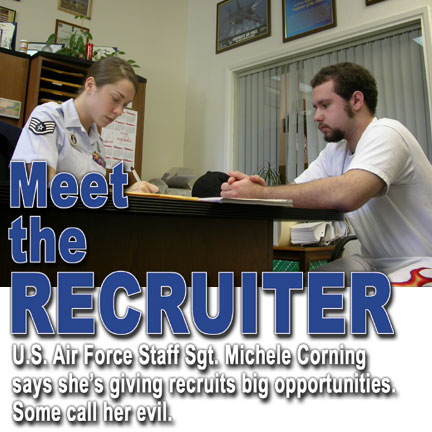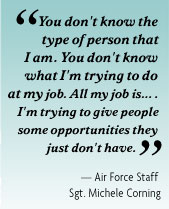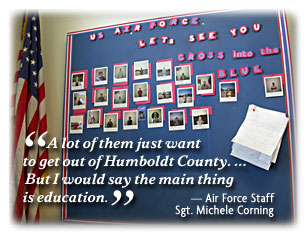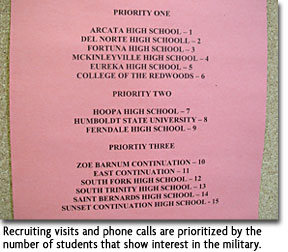|
 
COVER STORY | IN
THE NEWS | STAGE
MATTERS
TALK OF THE TABLE | THE HUM | CALENDAR
February 16, 2006

story & photos by HELEN SANDERSON
AT THE SOUTH END OF THE EUREKA strip mall named
Victoria Place is Staff Sergeant Michele Corning's office. Corning
is a recruiter for the U.S. Air Force, the only recruiter covering
Humboldt, Del Norte and Trinity counties for her service.
Walk into her office and immediately to your left,
next to the American flag, there is a bulletin board, done up
in red, white and blue, pinned with 22 Polaroid pictures, each
of a smiling young person. Three of them are women/girls.
Above the portraits, in construction paper block
letters, it says "US Air Force, Let's See You Cross Into
the Blue," the branch's new advertising slogan, likely familiar
to anyone who watches MTV. Tacked beneath the photos are a few
letters sent to Corning from recruits away at basic training
in Texas.
"Those are the people I've put in, and his
picture will be put up soon," says Corning. She's referring
to Paul Divelbiss, an 18-year-old with fuzzy sideburns and a
goatee, wearing shorts and a T-shirt. He's seated opposite Corning
at the edge of her desk.
Corning, 27, is a slight woman from Utah with engaging
blue eyes and neatly coiffed eyebrows. She has two associates
degrees and is eight classes from a BA in human resources. Eventually,
she says, she wants to get a master's degree and a Ph.D in medical
anthropology.
In the small world of Humboldt County military
recruiting, she's the odd woman out. First of all, she's a one-person
show, the only Air Force recruiter on the North Coast. The Army,
Marines, Navy and Coast Guard, whose offices are lined up beside
Corning's at the Armed Forces Recruiting Center, have a few recruiters
per office to cover the same area.
Unlike the Marines or Army, which have been hurting
for recruits throughout much of the war, the Air Force is picky
about who it takes into its service. The Air Force slashed recruiting
numbers in 2005, from 35,000 enlistees to 24,000. "We're
hiring the ones that are qualified, and not just warm bodies,"
Corning says. Meanwhile, the Army, for instance, has lowered
educational standards and increased the age for enlistees.
The other recruiters who work next door tell Corning
she has it easy. "They call us the `Chair Force' and `civilians
in uniform,' she says. "They think the Air Force has it
good."
On a personal level, she's teased even more. "I'm
made fun of by the other recruiters because I'm a vegetarian,"
she says. She is also married to an artist, objects to wearing
fur, shops at the Eureka Co-op, plays the bongos and has other
"liberal opinions" she wished not to share. "My
supervisor and my co-workers, they just call me this hippie."
But if she gets grief from her brothers-in-arms,
it's nothing compared to what she sometimes gets from the public
at large. She's in the heart of Humboldt County after all, contending
with an active left-of-liberal community that's fervently opposed
to war in Iraq. In the year and a half she's been stationed in
Eureka, she has uncomfortably watched war protests march by,
some of them taking place right outside of her workplace.
At the last major peace rally on Nov. 18, part
of the National Day of Protest, Corning was interviewing a potential
recruit when Critical Mass bike riders and picketers began swarming
toward her office door. Corning recalls when a protester, lying
on the concrete, yelled at her, "You're evil!"
Three months later, and the affront still sticks
in her craw.
"I'm not evil, by any means. All she [the
protester] could know is that I'm an Air Force recruiter. But
you don't know who I am. You don't know the type of person that
I am. You don't know what I'm trying to do at my job. All my
job is" She pauses. "I'm trying to give people some
opportunities they just don't have."
They're gonna trick you
Paul Divelbiss, today's prospect, is from Crescent
City.
"It's a small town," he explains, bopping
his knee up and down as he fills out paperwork. He says he's
enlisting because he's "always wanted to travel outside
of the country," especially to Germany, and that he has
long wanted to fly F-15s and F-16s. He's been working in a grocery
store.
Corning echoes his sentiment: "There's nothing
going on up there."
Divelbiss has settled upon what job to pursue in
the Air Force -- security forces, or Air Force Police, one of
the more dangerous jobs the Air Force offers. If he gets what
he wants, chances are that Divelbiss will eventually go to Iraq.
He knows that.
"I'm ready to step out of my comfort zone,"
he says. "Everybody has to."
But Divelbiss hits a bit of a stumbling block.
When Corning measures his height and weight as part of a medical
pre-screening, he is too heavy. He needs to lose a few pounds
before he goes to MEPS -- the Military Entrance Processing Station
-- in San Jose on Thursday, Feb. 16. MEPS is the first hurdle
in joining the military, where a recruit's physical qualifications,
aptitude and moral standards will be judged. It's also where
a recruit will sign up for Air Force jobs, of which there are
150 to choose from. This meeting with Corning is Divelbiss' official
MEPS briefing.
He'll leave on Wednesday, which happens to be his
19th birthday. To quickly shed that weight, Corning recommends
he drink Smooth Move, a laxative tea. It's available at the natural
food store in Crescent City, she says. His response was a drawn
out: "Uh," finally punctuated with an affirming laugh.
Divelbiss, a graduate of Del Norte High School,
met Corning in the fall of 2004, when he was a senior.
"It's weird, the first time we met it was
11/17/04, and then I didn't see her again until 11/17/05, exactly
one year later," Divelbiss says. "We didn't plan that
out, nothing." (Divelbiss' second meeting with Corning was
at her office, and as it happened, occurred just one day before
the protest in which she was called "evil.")
As for why it took him so long, a whole year, to
get to this point, Divelbiss explains he wanted to "cool
off" for a while after high school, spend time with his
family and make sure he was making the right decision. He finally
came around because Corning gave him time to think it over. The
Marines and Navy were pushy, he says, and the "Army guy"
wore street clothes rather than a uniform, something Divelbiss
viewed as "unprofessional."
"She let me think it over," he says.
And Corning says that's how she plays it with all
potential recruits. She won't push. It's not her style, she says,
and besides she was taught in recruiting school not to pressure
anyone.
"We want to make sure they want to be in the
Air Force," she says. If they arrive at MEPS unprepared,
or if they back out at the last minute, she'll look incompetent
to other Air Force personnel. An unprepared recruit might think
less of her too, risking her reputation with the recruit's friends
back home.
Corning lays out Divelbiss' itinerary by memory.
He'll be picked up from the airport by Sgt. Washington,
who will wait outside in a white government vehicle. There will
be a meeting at 8:30 that evening, and he must be in his hotel
room by 10:30 p.m. At 4 a.m. he'll get a wake-up call. He should
shower, dress comfortably but appropriately -- no shorts, no
obscene clothing, no pierced jewelry, no G-strings, no crotchless
underwear. There will be a lot of waiting around for his medical
exam, she says, so bring a Gameboy or a book. There will also
be a drug test.
"There are no second chances for the drug
test," she says. "If you're positive you are permanently
done for the Air Force. OK? You good?"
"I'm good," he says.
"There can be no new news," she
says, slapping the table three times for emphasis. What she means
is, if there is any unsavory information from his past that he
has not divulged, like a criminal record, he needs to speak up
now.
"[At MEPS] they are going to scare you, they're
going to threaten you, they're gonna say `We're gonna fine you
$10,000, five years in jail. I know you're lying to me.' Or they'll
say, `Yeah, those parking tickets that you had, what are they
about? And you'll be like, `Parking tickets?'
"They're gonna trick you, they're gonna call
you a liar, they're gonna scrutinize you. That's their job; to
break you. They want to make sure there is no new information.
So if for some reason, you stole a pack of gum at 5 years old
and I mean, nobody knows about it why do they need to? There's
no point."
She asks once more. "So, no new news? They're
gonna scare you."
But there's nothing to confess.
"It's fine with me," he says.
Disneyland
Corning says that Del Norte High welcomes her more
warmly than any other campus. Every week she makes the 85-mile
commute to Crescent City, and it seems to have paid off. Most
of the 22 recruits she has "processed" have come from
Del Norte.
"I think Michele is popular, she relates well
to kids," said Sally Roy, a Del Norte High School guidance
counselor. "She's had a lot of consistency up here; they
know on Wednesdays in the middle of the day she'll be here."
Last year, 4 percent of graduating seniors from
Del Norte High joined the military. That number is down from
years prior. In 2002, 12 percent of seniors enlisted. (The numbers
of students enlisting recently is fairly uniform across the region,
with 3 to 4 percent of Eureka High students, 6 percent of McKinleyville
High students and 4-5 percent of Fortuna High students signing
up in 2005. Calls to Arcata High School were referred to Principal
Bob Wallace who did not return a phone call from the Journal.)
Roy said that this year there seems to be more
interest in the military. More students took the ASVAB -- the
Armed Forces Vocational Aptitude Battery test -- this year than
last year. She was unsure of the reason for the upswing in interest.
Some of Divelbiss' friends have already joined
the Air Force too. It's likely that his peers' experiences in
the military influenced his own decision. The military hopes
the cycle will continue, and Divelbiss will encourage his buddies
to join.
"It's called perpetuation," Corning says.
It makes her job a little easier.
Some schools are harder to work with than others.
Last year, the Northern Humboldt Union High School District,
which oversees Arcata High and McKinleyville High, debated a
resolution designed to keep military recruiters on a tight leash.
The draft resolution, which was crafted by progressive board
member Kathy Marshall, included a provision to allow counter-recruiters,
like Vets for Peace, on campus whenever the military was there.
In the end, it was scaled back to lessen the constraints on recruiters.
Shane Brinton, who won a seat on the NoHum school
board in a divisive November showdown, would have liked to see
the original resolution stand. At 18, Brinton was the youngest
candidate, the most articulate and definitely the most liberal.
The College of the Redwoods student's platform was largely focused
on limiting the campus liberties military recruiters have enjoyed.
His other mission was to heighten awareness to the "opt-out"
option, wherein students can keep their private contact information
out of recruiters' hands.
"One of my main points of opposition to recruiters
is that the schools need to be a place for learning how to be
citizens, and also pursuing academics," he said in a phone
interview Friday. "If [students] want to join the military
they can do that outside of school.
"I would say that for the most part,"
he continued, "recruiters haven't been rude or mean the
way that you've heard in other places. I just think it is a nuisance
to have them there."
A specific intrusion Brinton remembers from his
not-so-long-ago days as an Arcata High ninth grader was when
an Army recruiter came to the school with a rock-climbing wall
and a Hummer blaring "this really terrible music; corporate
hip-hop."
No doubt some kids with less refined tastes than
Brinton's like what the recruiters have to offer, even if it
just means getting out of class for an hour. But when a recruiter
offered him a T-shirt years ago, Brinton said no thanks.
"I thought it was offensive, but the people
were friendly," he said. "But I think having a rock
wall there and giving [students] sports drinks and T-shirts,
it felt like Disneyland. That's my main thing with recruiters,
is that they're not telling the truth. Even if they don't believe
that they're intentionally lying they're trained to lie about
the nature of war."
Corning does have "goodies" to attract
students and spark conversation -- lanyards, soccer balls and
pens. In April, she's hoping to book a miniature F-22 to come
to Redwood Acres, and toward the end of the school year to bring
some flight simulator games to Eureka High.
But she says she has nothing to hide, and that
she is honest, perhaps to a fault: "Maybe I'm not doing
some of my job -- to be a salesperson and trick them, like a
dirty salesperson who sells cars," she says. "Maybe
I'm too honest and that hurts me a little bit, but I'd rather
be honest than get a bad rap."
In terms of the war, specifically, she says "Just
because I'm an Air Force recruiter doesn't mean I'm putting people
into war."
However, she says she always tells recruits, "If
you don't want to be part of this war then I don't think you're
ready for a military environment. But if you are aware that some
of the jobs might take you ... not necessarily to war, but to
those locations, are you OK with that? If they say no, then sorry
-- that job will take you there."
Jobs like security forces and pararescue operations
will likely head to war. But jobs, say, in the medical field,
are far less likely to go to Iraq, according to Corning. Only
one of her recruits has served a tour of duty there. (Corning
points out that next to the Coast Guard, the Air Force has the
fewest number of troops in Iraq and the fewest casualties. She
likes to say that 80 percent of the Air Force's mission is humanitarian.)
Free lunch
When she's "zone prospecting" -- walking
around downtown or at the mall in her uniform, courting the chance
that someone might stop her to talk about the Air Force -- Corning
gets some weird looks.
Once, when grocery shopping at the Co-op in Eureka,
two people approached Corning and told her to quit her job. Other
than being called "evil" Corning says that's the only
"really negative" encounter she has had.
Another food-related incident was more positive.
While eating lunch at Denny's in Crescent City, the waiter took
her check away before Corning could pay. An old couple at the
other end of the diner paid the bill.
"I went up to them and said, `Thank you for
paying for my lunch,'" she recalled. "They said, `No,
thank you for your service, we appreciate what you're doing.'
It feels good."
Corning seems to view her work similarly -- to
help someone get a free lunch, so to speak: A free education,
free rent and travel in exchange for a four-year commitment to
the military.
"A lot of them just want to get out of Humboldt
County," she says of her enlistees. "They want to travel.
A lot of it is patriotic, they just want to serve their country.
But I would say the main thing is education."
The second biggest concern, she says, is money.
"I meet a lot of people that are just not
directed, and I'm hoping to direct them," she said. "I
didn't have money for school. I didn't really have anywhere to
go. I was in Utah, going from job to job, and nothing was appealing
to me. And my friend was in the Air Force and he loved it. I
think it was the first good decision I've ever made. I've been
to Turkey and Saudi and Egypt. The thing I loved -- granted,
I love my job -- but I got to go off base and see these cultures
and the way these people live."
Keep moving
Recruiting at Humboldt State University is not
typically fruitful, but Corning is still required to walk around
the campus in her uniform once a month. "They just don't
seem interested," she says.
She has tried to establish a presence there in
her own way. She's an avid runner, and she often jogs through
the forest trails behind the university. At one trailhead there
is a bulletin board, and she always leaves one of her business
cards there. Most of the time it's gone by the time she returns,
which makes her happy. But sometimes it's been taken down, shredded
and left on the ground.
"OK, even though this person might not believe
in the military, there might be someone else who wants a chance,"
she says. "So it's a little unfair." But she still
tacks a new one up every time she passes by. "You still
gotta do it. I guess my point is that you can constantly rip
up my stuff but you're not gonna stop me. I still have to do
my job, and it's a hard job."
Some of the recruits she's sent off to basic training
want to come back and work with her as a "recruiter's assistant."
The one airman who completed a tour of duty in Iraq came back
to Eureka as an assistant. And in one letter hanging on the bulletin
board in her office, another airman requested to come to "do
the recruiter's assistant thing" as well.
It could be a testament to Corning's character
that people would like to work beside her, and in effect share
the burden of a tough job. The more likely reason is that they
just want to come back home; the recruiting office is the only
Air Force station in Humboldt County. The nearest Air Force bases
are in the Sacramento area.
As for Paul Divelbiss, he's likely being scrutinized
at MEPS as this story hits the stands. If he passes his tests,
he'll go to basic training, then to a specific training school
for whichever job he picks, or is assigned to. From there, he's
got at least four years to serve. With experts estimating the
end to Operation Iraqi Freedom to be at least five years away,
he could very likely find himself stationed in a war zone.
Corning says that she's enjoyed her time in Humboldt
County for the most part, but she's hoping to be reassigned to
a recruiting office in upstate New York, to live near her identical
twin sister, a kindergarten teacher, who just had her first baby,
a girl.
"I'm ready to move on," she said.
When she finally leaves, the beaming 18-, 19-,
20-year-old faces captured in those Polaroids will be taken down,
and the next recruiter will begin the hard task of tacking new
ones back up.
TOP
COVER
STORY | IN
THE NEWS | STAGE
MATTERS
TALK OF THE TABLE | THE HUM | CALENDAR
Comments? Write a
letter!

© Copyright 2006, North Coast Journal,
Inc.
|




